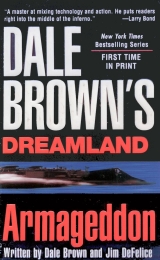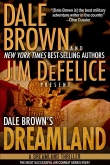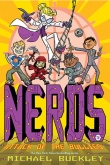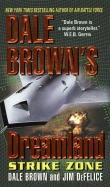
Текст книги "Armageddon"
Автор книги: Dale Brown
Жанр:
Боевики
сообщить о нарушении
Текущая страница: 9 (всего у книги 20 страниц)
What was safety? Being comfortable? Being immune to attack? She’d been on combat deployments and in test aircraft and not felt vulnerable. It was when she’d been accused of being a traitor to her country—that was when she had felt vulnerable.
Why’? Because people didn’t believe in her? Or because she didn’t believe in herself?
Was she afraid that she might be a traitor? That she might not truly believe in all the things she professed to believe?
That her father, dead before she was born, might think of her as an unworthy daughter?
Dog rolled away onto his side. Jennifer slid over, pushing her hand up across his arm and then over his chest, clutching him from behind.
Tecumseh believed in her. He loved her. She could feel it like a physical thing, a coat she could wear. He was inattentive at times, maddeningly so. But he had many concerns, and the same could easily be said of her. His love, however, couldn’t be questioned.
She pressed her breasts against the muscles of his back, starting to drift back to sleep.
And then the phone rang.
“Rrrrr,” said Dog, the sound more like a snore than a word.
“Phone?” she muttered.
“Yeah.” He reached toward it, dragging the receiver to his ear. “Bastian,” he said.
Jennifer already knew that it would be Dreamland—and that it inevitably meant it was time to get up. She sighed, then swung out of bed to take a quick shower before dressing.
Brunei
1930
“We have to get missiles for the Megafortress,” Mack told McKenna as he drove back to the airport. “I’ll try calling around and see if I can break through the paperwork crap. Maybe I can beg some out of Dreamland.”
“What do we need?”
“Sidewinders, AMRAAM-pluses. We could use older AMRAAMs if we had to.”
“How about Sparrows?”
“AIM-7s? I don’t know. I think the Megafortress can fire them off the rotating dispenser in the bomb bay, but I’m not sure,” said Mack. “I don’t know what sort of avionics link they need or if it was hardwired into the computer or what”
“Well, find out.”
“Well, no shit.” Mack saw her scowl and laughed. “But assuming I find out, what difference is it going to make?”
“I know where we can buy some.”
“Sparrow missiles? How?”
“Ask me no questions, I’ll tell you no lies,” said McKenna. “But we can have them in a few hours, assuming we go to pick them up ourselves.”
“Where?”
“Philippines.”
“Shit,” said Mack. “Is this legal?”
“Legal for who?”
Mack snorted. “Okay. What about air-to-ground weapons? Smart bombs?”
“How about early model Mavericks?”
“I don’t know,” said Mack. “I can check though.”
“Well, check.”
The Maverick—officially known as the AGM-65—was an American air-to-ground missile developed at the end of the 1960s and into the early 1970s. It came in a variety of flavors, guided by infrared and video. Though old, it was an effective weapon, especially against tanks and other hardened targets.
“We need more small bombs for the A-37s,” Mack told her. “Can you get some?”
“We may be able to get all of this from the Philippines,” said McKenna. “There are some people there that Ivana knew. They’re a lot further down the food chain, though, and they’re going to be expensive.”
“Sultan’s just going to have to pay through the nose if that’s what it takes,” said Mack, slowing down as he approached the gate at the airport. A pair of army soldiers stood near the main gate; Mack got ready to stop but they didn’t challenge him, or the car behind them carrying his soldiers and the new recruits who had joined him from the defense ministry.
“They still aren’t taking this seriously,” complained Mack as they rolled through.
“They’ve been fat too long,” said McKenna.
“Ain’t that the truth” Mack sped toward the tower, where the army and police guard had been augmented by his own air force people. “I want to rotate the Dragonfly crews so we have airplanes in the air at all times. Yayasan can take the first flight with you in the morning—”
“I fired him.”
“What are you talking about? He’s one of our best pilots.”
“He was flying wing with me this morning. He lost his guts when I went after the helicopter.”
“You just fired him?”
“Soon as we landed. What good is a pilot who loses his nerve? He’s chicken.”
Mack might have said the same thing himself a few weeks before. But now he saw that there were many more jobs in the air force than flying planes. He could have found something for Yayasan to do.
“Okay,” said Mack. “You gotta do what you gotta do. But from now on, I do the hiring and firing, all right? We might have been able to use him on the ground”
She pursed her lips for a second as if she were going to pout, but then said, “Sit, yes, sir.”
“Fuck you, McKenna.”
“Any time, Mr. Minister. Anytime.”
Off the coast of Brunei
2200
Dazhou Ti leaned forward over the weapons officer’s shoulder, looking at the screen. When they had drawn up the mission, they had not dared to hope for such luck—both of the Brunei navy’s new patrol vessels were sailing together in the direction of the oil platforms west of the Bay. The two ships were separated by less than a hundred yards.
The only question was whether to use his last Exocets on them, or to close in with his torpedoes and cannon.
Dazhou wanted to reserve the precious French-made missiles; he had only four, and there was no telling when or even if he might obtain replacements. But the two Russian-made Nanuchka-class ships were capable enemies. They had powerful surface-search radars, and as stealthy as the Barracuda was, it could not count on escaping detection once it began firing its cannon.
“Range is twenty kilometers on target one,” said the weapons officer.
“Prepare to fire.”
Dazhou turned toward the helmsman, who was holding to a steady course. Dazhou could see the speed sliding below two hundred knots on the screen, pushing down toward one hundred. While the engineers claimed that a launch speed of one hundred was optimum, Dazhou had concluded from their earlier missions that anything faster than eighty knots increased the margin of error unacceptably; the missile they had launched this morning had actually struck a storage tank beyond the one they were aiming at. The trick was to hold the craft steady at that speed, as it began to settle around eighty-five, losing the benefits of its stubby wings.
“Target is locked,” said the weapons officer. “Speed?”
“One-ten”
“Steady.”
“Ninety-five knots. Eighty-five.”
“Fire missile one.”
“Firing”
“Fire missile two”
“Firing.”
“Target two is changing course!” said the radar operator.
Dazhou looked across the deck at his screen. The second patrol vessel was turning eastward toward them.
“Prepare missiles three and four.”
“Ready to fire, sir.”
“Missile in the air!” warned the radar operator.
For a split second, Dazhou felt his breath catch deep in his chest. The Brunei navy vessel had fired one of its SS-N-9 Siren anti-ship missiles. The missile’s warhead carried roughly 6,600 pounds of explosives—more than four times the weight of the Exocet.
“Prepare for evasive maneuvers,” he said. Then he turned to the weapons officer. “Are we locked on the target?”
“Yes, sir.”
“Fire. Both missiles.”
The ship rumbled with the launch as the slender French missiles jumped from their tubes behind the bridge area. The Barracuda then abruptly settled into the water. Dazhou’s decision to fire had cost him the wing in surface effect, making it almost impossible to race away.
But he had no intention of doing so.
“Evasive maneuvers. Chaff and ECMs,” said Dazhou.
The Barracuda lurched sideways as the helmsman tried to duck the incoming missile. A quartet of small mortars pumped shards of aluminum, copper, and tin into the air, creating a fog for them to disappear behind.
“Still tracking us,” reported the defensive weapons officer. “Continue evasive maneuvers,” said Dazhou calmly.
He stood over the radar operator’s station, watching the display.
“Still tracking,” reported the defensive weapons officer.
“ECMs are on?”
“Affirmative, sir.”
“Target one hit. Hit on target one,” said the offensive weapons operator.
Dazhou struggled to keep his head clear. The missile was still tracking them. He’d thought it would be easier to duck in stealth mode.
Should he have run?
“More chaff,” he said. “And flares as it closes.”
“Ninety seconds,” reported the radar operator.
“Strike on two! Strike on two!”
Yes, thought, Dazhou, we have sunk both. But that will be of small consolation if they hit us as well.
The Barracuda slapped left and right, then left again. The enemy missile continued to home in on them.
Dazhou went to the weapons station. They could use the small cannon as a last-ditch weapon and try and shoot the missile down from the sky. The twenty-millimeter gun was an excellent weapon and the SS-N-9 relatively slow moving, but still, they would have only a few seconds to hit it. The gun was in the nose of the ship and the craft would have to be turned to fire. They would also have to kill their engines to increase the odds of success.
“Come around so we can bring the small cannon to bear;” Dazhou told the helmsman.
“Aye, sir,” he said, already starting the turn.
“Still coming!” warned the radar operator.
It’s looking at our radar, Dazhou realized. The Russians had sold Brunei a radar homing device, and they had been smart enough to use it.
“Turn off the radar,” said Dazhou quickly. “Fire more chaff. Helm, resume evasive pattern.”
The mortars with the chaff roared at the back. The Barracuda hunkered down as her helmsman, worried that turning too sharply would tip them over disastrously, shunted left vaguely, then back right.
“Harder, helm,” said Dazhou. He reached to the control wheel, placing his hand on his crewman’s. He was not showing the man that he didn’t lack confidence in him—he was taking responsibility for the brash maneuver.
The Barracuda roared and shot left, nearly pirouetting around on its wing and flipping over as it tried to follow the harsh jerks on its controls. Dazhou barely stayed upright as they jinked across the ocean left, left then right and right again, left, right, left.
“Chaff!” he called again. “And flares.”
The diversionary weapons exploded from the rear.
Dazhou pulled his arm up. For a second, two seconds, he did not breathe.
And then he knew they were safe.
“Very good,” he told the helmsman, even before the defensive weapons operator and the radarman reported that they had lost track of the enemy missile.
“Head back toward our targets,” Dazhou said calmly. “Let’s make sure they don’t need to be finished off. Remain in stealth mode. Do not activate radar except on my command,” he added.
Within seconds, they were pointed back toward the two Brunei patrol ships. Both were on fire, one clearly taking water. A distress signal came over the radio band.
“Go no closer than ten kilometers,” Dazhou told his helmsman.
“Aye-aye, captain.”
His crew had performed well. He himself, however, might have realized why the SS-N-9 had stayed on them much sooner than he had. In truth, the earlier attacks had made him far too cocky; he should have approached without his radar as he had before.
An important lesson. He would remember to apply it tomorrow, when the stakes would be even higher.
IV
H IGH S TAKES
South of the Philippines
12 October 1997, 0308
MACK CHECKED HIS GPS READING AS HE APPROACHED THE dark island, making sure he was in the right place before taking the Megafortress down through the storm. Jalan, his copilot, seemed calmer than he had been yesterday; maybe the fact that the man had had very little sleep before being roused for the mission had calmed him somehow.
“Infrared still blocked:’ said the copilot as Mack pushed the Megafortress downward.
“Yeah, the rain’s going to play havoc with our sensors:’ Mack told him, speaking over the interphone. “I want you to watch our altitude and that little lump of sugar guarding the approach”
“Yes, Minister.”
The “lump of sugar” was a mountaintop 1,335 meters above sea level which Mack had to skirt to get onto the runway. As an added bonus, the runway would have no lights and be wet besides. But then again this was probably the perfect weather for arms smugglers.
McKenna’s contact had promised eight Sparrow missiles, two Sidewinders, and a dozen five-hundred-pound bombs. To pay for this windfall, Mack had emptied the air force treasury of the hard currency kept in the safe for operational emergencies—essentially petty cash, though fifty thousand American dollars was hardly petty. The cash was just the down payment; he had had to authorize wire transfers from a number of accounts, including his own. All together, the black marketeer had demanded $265,000 for the weapons. That was a veritable bargain, as the U.S. air force reckoned the cost of one Sparrow missile at $225,700, but then again, these guys didn’t have the same overhead costs.
“There, Minister,” said Jalar, pointing to the peak, a shadowy lump of danger materializing in the right half of the windscreen.
Mack was closer to the mountain than he’d thought. He nudged the stick slightly, blowing a wad of air from his lungs. The computer helping him fly the plane now came into its own; he selected the synthetic landing assist module and a ghost of the unlit airfield appeared at the top of a small square on his HUD. Mack had programmed the destination into the computer before takeoff; the silicon brain was able to find the airfield in its extensive database even though it had been abandoned by the U.S. and Filipinos a decade before. As they approached, the Megafortress used its sensors—in this case its radar and GPS—to verify the preloaded image, confirming that there was an air base there. Mack could proceed in as if the airfield were broadcasting a set of guidance signals the same way a commercial airport system would show an airliner how to land in inclement weather.
Almost. Mack was not only landing completely in the dark, but there was no way to know whether someone with an antiaircraft cannon was waiting on the nearby hillsides.
“Landing gear down,” confirmed the copilot as they worked through their routine.
The Megafortress’s wheels hit the end of the slick runway hard as a burst of wind pushed Mack down a split-second sooner than he anticipated. Computer or no, the nearly 350,000 pounds of aircraft, fuel, and men represented a massive amount of energy trying to go in several different directions at once. Mack broke into a serious sweat as he worked to keep the plane moving in a straight line toward the end of the runway, applying brakes and going to reverse thrusters all on cue from the computer. As they came to a stop, Mack spotted a tiny pinprick of light on his left. It blinked twice, the signal they had agreed on. Mack was supposed to kill his lights to confirm that they’d seen the signal.
It seemed a bit superfluous—how many other big jets would be landing on this runway tonight? But he did so, bringing them back on as he found the small apron on the right and turned the aircraft around, trundling back gingerly on the narrow ramp to the point where he had landed.
The rain was now an intermittent drizzle, but it still made it difficult for the IR gear to see anything. Mack switched over to the low-light video, making sure Jalan would be able to monitor what was going on once they were outside.
“Keep the motor runnin’,” he told the copilot, undoing his restraints.
“Yes, Minister,” said Jalan.
Mack pulled off his helmet and survival vest, exchanging them for a com set, flak vest, and small radio. The two soldiers who’d been sitting on the flight deck had already gotten up and were checking their weapons. Brown got up somewhat shakily from the jumpseat at the rear. He’d spent the flight memorizing the instructions from the computer library on how to work the AIM-7s into the Megafortress weapons controller.
Mack went to the weapons locker at the far end of the deck and retrieved his own weapon, an MP5 submachine gun, as well as an attaché case with the cash.
“Let’s do it, boys,” he shouted over the loud hush of the Megafortress’s idling engines. He tossed the attaché case to Brown and started down the ladder.
Two other soldiers had ridden on the Flighthawk deck; the four men fanned out behind Mack as he walked forward along the edge of the concrete, striding toward the edge of the white-yellow halo thrown off by the Megafortress’s landing lights. His heart pounded; he moved his finger away from the trigger of the MP5, aware that his adrenaline level was off the board.
“Yo, assholes, let’s get this show on the road. I don’t have all night;” he yelled to the darkness.
A set of truck lights switched on in the distance. Mack stopped.
“Fan out, men,” he told the soldiers accompanying him. “Don’t shoot the bastards unless I say so. Jalan, what’s coming at us?”
“Pickup truck, two men I think,” said Jalan. “Empty.”
“All right, be cool,” said Mack. He had expected the weapons dealers to show some caution, but was nonetheless disappointed that they were coming forward in a truck that obviously didn’t have the goods.
The pickup stopped about thirty feet from Mack. It left its high beams on; he took two steps to the right, avoiding the worst of the glare.
“Minister Smith?” said a voice that sounded more Hispanic than Filipino.
“In the flesh. Where are my missiles?”
The truck door opened. Mack’s men snapped their weapons up behind him—a nice little flourish, thought Mack—but the man proceeded across the concrete calmly. Something red flared in front of his face: he was smoking a short, monstrously fat cigar.
“Minister Smith,” said the man, sticking out his hand. “Allow me to introduce myself. José Cadero, purveyor of goods.”
“Where are mine?” said Mack, not taking the man’s hand.
“Ah, Minister, first we make sure we have the money, then we complete the exchange.”
“No goods, no money,” said Mack.
“Ah, no one is trustworthy these days. But, as you are a new customer, this is understandable.”
He turned around and started to reach into his pocket. Mack slapped his hand on the man’s arm.
Despite his small size, Cadero had a large and hardened bicep; it felt like a boulder in Mack’s grip.
“I just have to give a signal,” said the man mildly.
Mack let go. Cadero took out a small walkie talkie, pressed the transmit button, and said “Sí.” Another truck, this one with a loud, unmuffled engine, started in the distance.
“Cigar’?” Cadero asked.
“Not right now,” said Mack.
Cadero smiled and took a big puff. “I must say, an impressive aircraft.”
“You don’t know how impressive,” said Mack.
“Oh, I have seen reports. It is a superplane. Did you bring Flighthawks?”
“They’re overhead,” lied Mack.
“Impressive,” said Cadero, looking upward. “I understand they fly by remote control and fire thirty-millimeter cannons?”
“Twenty millimeter. Similar to the M61 in F-16s and F-15s”
Cadero smiled. “I can get shells.”
“Let’s focus on the Sparrows and bombs for now.”
An ancient American six-wheeled truck rolled slowly down the runway. It had a flatbed at the back; several boxes were stacked atop of it.
“Six people, all with M16s alongside the truck,” said Jalan.
“Thanks,” said Mack. “Don’t blow them up unless I tell you to”
“Were you talking to me?” asked Cadero.
“Just my crew,” said Mack. “They’re a little jumpy in the plane. You understand. Long flight and all. They want to stretch their trigger fingers.”
Cadero smiled, but seemed somewhat less easy than before. When the truck stopped, Mack walked to it and climbed up with Cadero. The air-to-air missiles were in long wooden crates marked “bicycles” in English, a rather half-hearted attempt at camouflage. Two of Cadero’s men took a box down and opened it for Mack; the long, finned body of an AIM-7E sat in a bed of wood shavings.
Mack jumped down to the ground and took the attaché case from Brown.
“Check them all,” he told him. “Then get them loaded.”
“Yes,” said Cadero. “The bombs are in the smaller boxes at the front,” he added, pointing at the truck bed. “You must be careful of the fuses. As I told Commodore McKenna, we can guarantee the explosives only; the fuses I do not vouch for.”
“She told me,” said Mack.
“She drives a hard bargain,” added Cadero. “But she said you would perhaps be interested in future purchases?”
“We definitely would,” said Mack. “Better air-to-air missiles, air-to-ground—”
“Better air-to-air? Than the AIM-7? Very difficult,” said Cadero.
“Aw, come on, you can’t steal AMRAAMs?”
Cadero became indignant. “These weapons were not stolen. They were purchased.”
“Not a problem,” said Mack.
“That is for me?” asked Cadero.
Mack handed the attaché case over. Cadero turned without opening it.
“Not so fast,” said Mack. “You don’t leave until I’m sure those weapons work.”
“But how will you be sure?”
“I’m going to fire one from the air.”
“But that could take hours”
“Only ninety minutes if Brown here does everything I’ve told him to do. Right, Brown?”
“Ninety minutes, Minister.”
“Come on. You can sit on the flightdeck. It’ll be the thrill of a lifetime.”
“Well, thank you, but—”
“If you don’t, my people in the plane will kill you all. Which seems kind of a rotten way to start a business relationship.”
Cadero took a puff from his cigar. Mack realized they were both acting; the question was, who was better?
“It is an impressive aircraft,” said Cadero finally. “And perhaps if I see it up close I will be able to make more recommendations for sales.”
“That would be welcome,” said Mack.
“But your man—he knows how to arm the missiles and arrange for them to be fired?”
“You better hope he does,” Mack told the Filipino. “Because if he doesn’t, you’re going out the hatch.”
Brunei
0600
McKenna gunned the Dragonfly off the runway, stowing her landing gear and climbing up over the Pacific. The Brunei navy had lost its two crown jewels overnight—a pair of brand new patrol ships purchased from the Russians through Ivana. The ships could only have been sunk by a missile attack, which meant the Malaysians had to be involved, but the reports were very confusing. The Brunei government was in deep disarray, several of its ministers still refusing to admit that the Islamic fundamentalist guerillas had declared total war on them.
Her wingman, Captain Seyed, checked in as she crossed over the water. Both planes were carrying bombs as well as full loads for the minigun.
“Dragon One acknowledges,” she told him. “We’ll go out toward the ships as planned, then circle back”
“Roger that,” said the wingman. While Seyed’s flying skills were as yet unrefined, the pilot had a gung-ho grin and a forward-leaning gait—no substitute for experience or ability, she realized, but positive attributes nonetheless.
The charred hull of one of the patrol ships floated on its side a few miles away, surrounded by small boats that were continuing to search for survivors. The ship carried a complement of sixty men; according to the morning brief, thirteen had been recovered.
Exactly none had been rescued from the other craft, which was somewhere beneath the oil slick further north. A set of oil derricks sat to the west, lonesome and uneasy sentries.
“Dragon One, this is AF Control,” said the ground controller back at their war room.
“Dragon One acknowledges, AF Control,” said McKenna. “Do you have information for me?”
“We have an urgent request—the palace is under attack,” said the controller.
“The palace?”
“Police units are responding.”
“Get a forward-air-controller over there on the double,” McKenna told him, changing course. “Have him contact me directly and tell me what’s going on”
Dreamland
11 October 1997, (local) 1730
Dog stood in the center of the command room, waiting for the feed to come through from the White House situation room. Finally, the screen blinked, and Jed Barclay’s pimple-studded face appeared.
“Colonel Bastian?”
“Hi, Jed.”
“President wants to speak to you, sir.”
The screen blinked, and Kevin Martindale appeared at the front of the room.
“Tecumseh, thanks for cutting short your weekend,” said Martindale.
“Yes, sir.”
“We’ve just had a National Security meeting discussing the situation in Brunei. Terrorists have launched a concerted attack against the entire country. There are rumors, which no one has been able to prove yet, that Malaysia may be involved as well. ASEAN is having an emergency session this evening, our time, to discuss the matter. In the meantime, it may be necessary to evacuate American nationals. The nearest carrier group was up north watching ‘ China and it’s going to be some time before they can get there in force, but they’re en route. Because your people are somewhat familiar with the sultan, I’d like you to stand by to offer assistance if necessary.”
“Yes, sir,” said Dog.
“I want someone I can trust to talk to the sultan,” said Martindale.
“Yes, sir.”
“We promised them two Megafortresses. Can they be delivered?”
“We do have two aircraft, but they’re not ready for them to take possession,” said Dog. “They still have Flighthawk apparatus.”
“What if we get them into the area, then prepare on the ground once they’re in place?”
“My crews would have to operate them in the meantime,” said Dog.
“How soon can they get there?” asked the president.
“They can take off tonight, along with transports to assist any evacuation, if needed. And security.”
“Do it.”
“Sir, I’ve received an informal request from their air force defense minister for weapons,” Dog added.
“What sort?”
Dog hesitated for a moment. Mack had spoken to Danny earlier, asking for “anything and everything.” It was a highly unorthodox request; even if Dreamland had been a “normal” air force command, U.S. units weren’t in the habit of loaning out missiles.
“They’re looking for air-to-air and air-to-ground missiles,” said Dog. “The Megafortress that we provided to them under the first phase of the demonstration project was equipped with Stinger airmines only.”
Someone stepped close to the president, and Dog saw an aide giving him advice.
“We’ll have to look into the request,” said the president finally. “There are treaty implications. But in the meantime, any Dreamland assets that are in the area must be equipped to defend themselves. Is that understood?”
“Amply, sir.”
“This is a Whiplash order,” added the president, making the deployment official. “You get with Jed if you need anything else.”
“Yes, sir,” said Dog as the screen went blank.
He looked over at the lieutenant on the communications desk.
“Tell Danny Freah it’s official. We’re deploying tonight. Get Zen as well. Is Breanna still on Brunei?”
“I believe she may be en route back home”
“See if you can locate her. You better call Major Catsman as well.”
“She’s on her way, sir. Chief Gibbs also called a little while ago to alert you that he would be in.”
“Ax called you?”
“Yes, sir.”
Dog thought of something else. He picked up the base phone and called over to Jennifer’s apartment.
“Hey,” he said when she answered.
“Well, hey yourself. Are we having dinner?”
“Maybe,” he said, glancing at his watch. “If you come over to my office with it.”
She hesitated a second but then said, “All right.”
“Where’s Ray Rubeo about now, do you think?” Dog asked.
“Uh, well, this being Saturday night ..
“You’re not going to tell me something I don’t want to know, are you?”
“Well, that depends on you, doesn’t it?”
RAY RUBEO PUT HIS LIPS AGAINST THE SILVER PIPE, hesitating for just a moment. He felt the muscles in his neck tense slightly as he pursed his lips; he tried to relax them, took a breath, then began to blow.
The beeper on his belt buzzed just as the first notes came out from the flute.
“It figures,” said the scientist.
His flute teacher looked up at him through her thick glasses.
“I’m sorry,” he told her. “I’m afraid I’m going to have to cut my session short.”
“Go ahead, young man,” she told him. “Your family is more important.”
Rubeo, bound by his agreements with the government not to divulge anything about his activities to outsiders, growled to himself but did not correct her.
THE MAN IN CHARGE OF THE KITCHEN AT DREAMLAND’S Red Room—officially an all-ranks mess but closer in practice to a civilian-style grill—was an air force staff-sergeant who not only looked younger than Jennifer but was twice as skinny. How Sergeant Jorge Boca stayed thin was undoubtedly a classified military secret, but one bite of his food cleared up any doubt how he had achieved his rank at such a young age: he had surely been promoted on merit.
Sergeant Boca could prepare anything from killer barbecue to grilled tuna with chipotle chili sauce. Dreamland might be the only military base in the country where seafood crepes were a regular feature on the lunch menu. And his blue-cheese burgers were worth marching twenty miles through the desert for.
It was his potato salad that Jennifer sought now. The wizard himself was on duty, dicing carrots as he oversaw his staff.
“Ms. Gleason of the wonderful long hair,” he said as she snuck in the back.
“Not any more,” said Jennifer.
“Have to come up with a new name,” said Boca, sliding his carrots aside. “What can we do you for?”
“A little picnic dinner?”
Sergeant Boca waved his knife in the air as if it were a baton. “For tomorrow?”
“For ten minutes ago.”
“Jennifer, Jennifer, Jennifer.”
“Cold chicken?”
“Tuna niçoise salad,” he answered, veering toward the refrigerator.
* * *
“I HAVE NO DOUBT ABOUT THE SENSOR COVERAGE,” SAID Rubeo, frowning at the map of Borneo Dog had spread over his conference room table a half hour later. “Deploying the blimps is another matter entirely. They have to be launched from the ground.”
“My guys can handle it in an afternoon,” said Danny Freah. “We just helicopter in to these six spots and we’re set. Once they’re in, we can add the others as we go”
“You’re assuming the Bruneians are going to remain in control of things there,” said Rubeo.
“You don’t think they will?” Dog asked.
The scientist merely frowned.
The alternative involved launching the blimps from the rear of a cargo plane at twenty-two thousand feet. It had been done twice during trials at Dreamland, using Dreamland’s MC-17D/W, a special version of the C-17 cargo aircraft. The results had been mixed.








